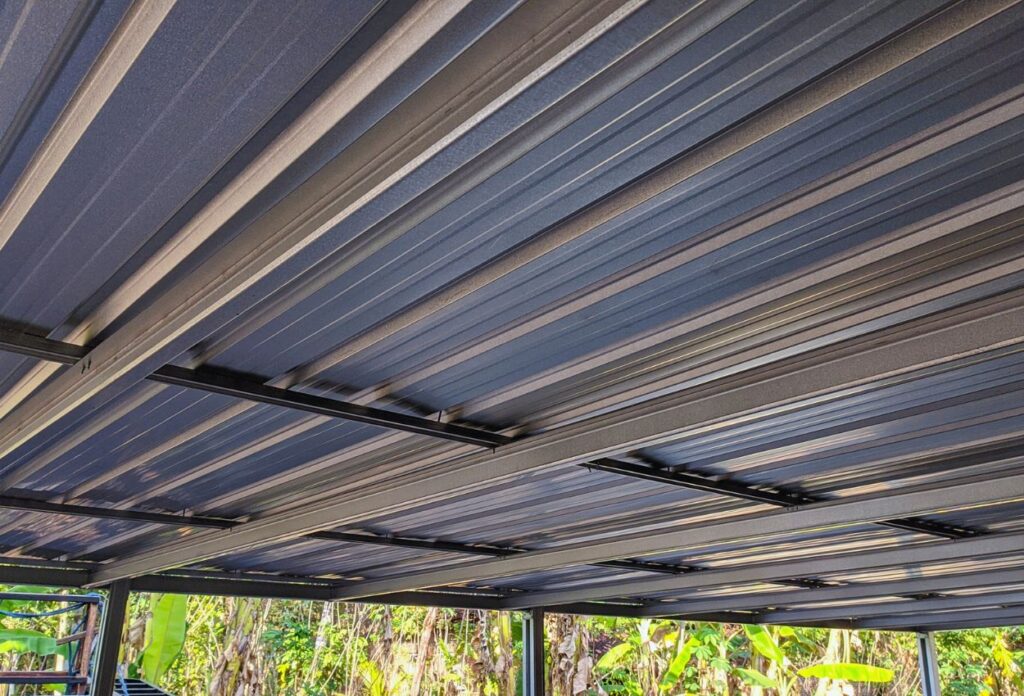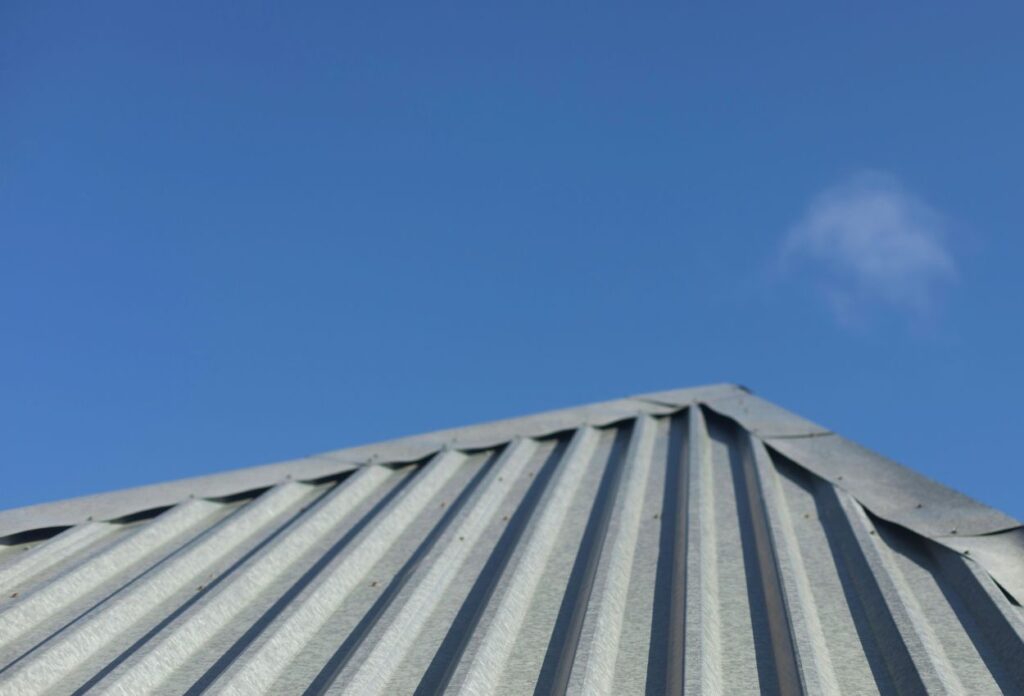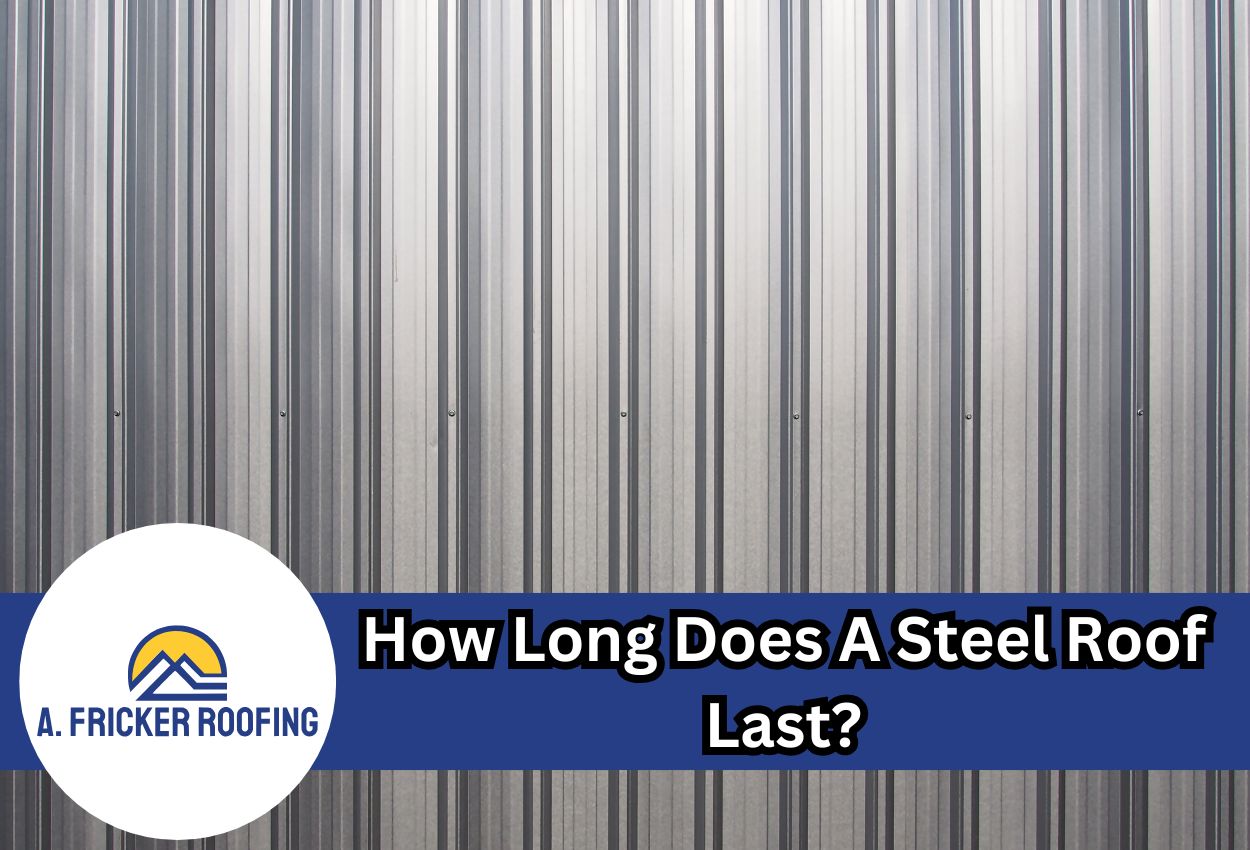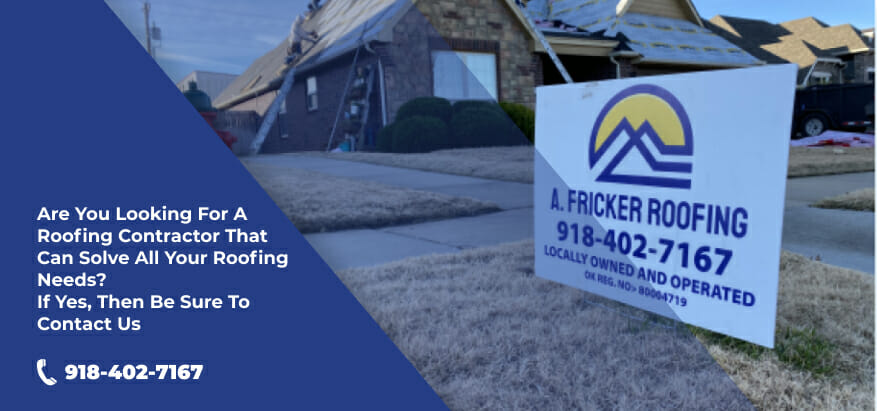When it comes to roofing, one question that pops up a lot is, “How long will my roof last?”
And if you’re considering a metal roof, you’re already thinking long-term. Metal roofs are famous for their durability, but there’s a catch: not all metal roofs are created equal. Each type of metal has its own lifespan, strengths, and weaknesses.
Steel roofs, our topic for today, are a popular choice. However, they come with their own lifespan range, leaving many homeowners wondering what to expect. Typically, steel roofs can last anywhere from 40 to 70 years, which is impressive.
But this is just an estimate. The actual lifespan depends on a variety of factors such as the type of steel used, ongoing maintenance, and installation quality.
In this blog post, we will answer the question: “How long does a steel roof last?” and give tips on how to extend its lifespan.
How Long Do Steel Roofs Typically Last?
The short answer? Between 40 to 70 years, depending on the specific type of steel roof and how it’s maintained.
That’s a wide range, but it’s still much longer than traditional asphalt shingles, which tend to last around 20 to 30 years. Steel roofs are built to handle the elements, resist fire, and stand up to wear and tear. But that longevity doesn’t happen automatically—it takes the right materials, installation, and care to hit the upper end of that range.
Let’s take a closer look at the types of steel roofs to see why the numbers can vary so much.
What Are The Main Types Of Steel Roofs and How Long Do They Last?
Steel roofing systems are tough, durable, and known for their high strength. Steel roofing materials are further divided into three types: traditional, galvanized, and galvalume. Here’s what to expect from each:
Lifespan of Traditional Steel Roofs
In the early days of steel roofing, manufacturers used uncoated or minimally treated steel. These were usually available in corrugated roofing systems. This basic form of steel roofing was strong but had significant limitations. Traditional steel was highly susceptible to rust and corrosion, particularly in challenging environmental conditions like high humidity or coastal regions with salty air. The lack of protective coatings meant these roofs had a relatively short lifespan, typically around 40 years—a considerable duration, but far less impressive compared to modern steel roofing technologies.
Lifespan Of Galvanized Steel Roofing Panels

Galvanized steel represents a significant advancement in metal roofing materials. This type of steel is coated with a layer of zinc. Zinc itself is durable and creates a robust barrier against environmental degradation. The zinc coating protects the underlying steel substrate by taking on the brunt of the damage. This process dramatically improves the roof’s resistance to rust and corrosion. Homeowners can expect a lifespan of approximately 50 to 60 years with proper installation and maintenance.
Also Read: Everything You Need To Know About Zinc Roofs
Lifespan Of Galvalume Steel Roofing Panels
Galvalume is the latest and the most durable type of steel roofing system available. Galvalume steel roofs last for more than 60 years. While galvanized steel uses zinc, galvalume takes it a step further. Galvalume steel combines zinc and aluminum coatings to create an even more protective roofing material. This innovative coating provides superior defense against corrosion, making it an exceptional choice for moisture-prone areas such as Oklahoma.
To sum up this section, the average lifespan of a steel roof is:
- Steel Roofs: About 40 years
- Galvanized Steel: 40 to 50 years
- Galvalume Steel: 60+ years
The type of steel you choose plays a huge role in determining your roof’s lifespan. And that’s just the starting point—let’s move on to other factors that can either extend or cut short your steel roof’s life.
Also Read: Top 10 Metal Roof Colors To Know About
What Affects the Lifespan of a Steel Roof?

In the section above, we covered how material plays a crucial role in deciding how long your roof will last. But even with the best materials, certain factors can influence the lifespan of your steel roof. Here are some things that can affect how long a steel roof lasts.
Weather and Environmental Exposure
Steel roofs are tough, but Oklahoma’s weather can put them to the test. For example, while steel roofs are resilient, hail storms can cause dents. Thicker steel or impact-resistant coatings can help minimize damage.
Tornados can do their fair share of damage too. While no roof is fully tornado-proof, steel roofs are highly wind-resistant and less likely to suffer catastrophic damage compared to other materials.
So if the area you live in is prone to bad weather, you may need to be extra vigilant about maintenance.
Quality of Installation
This is a crucial factor not only with metal roofs but for all types of roofing materials. No matter how durable the material is, a poorly installed steel roof won’t last. Improper alignment, weak fasteners, or gaps can make your roof vulnerable to wind, leaks, and other problems. That’s why it’s crucial to work with a skilled and experienced roofing contractor who understands the unique challenges of Oklahoma’s weather.
Maintenance
Steel roofs are low-maintenance, but they’re not maintenance-free. So while you do not need to spend as much time as you may have to with traditional roofing materials, you still need to be proactive.
- Clear Debris Regularly: Oklahoma’s storms can leave behind branches and debris. Keeping your roof clear helps prevent unnecessary wear and tear.
- Inspect After Storms: After a big storm, check for dents, loose fasteners, or other visible damage. A professional inspection is recommended for peace of mind.
- Clean Gutters: Ensuring your gutters are free of leaves and debris helps water flow properly and prevents pooling around the roof’s edges.
Wondering how to maintain your steel roof? Check out: Your Guide To Metal Roof Maintenance In 2024
Roof Design and Slope
The shape and slope of your roof play a big role in its longevity. In Oklahoma’s rain-heavy spring seasons, a steeper slope is better at shedding water, reducing the risk of pooling or leaks. Properly designed roofs also stand up better to strong winds and hail impact.
The Gauge Of A Steel Roof
The gauge of steel refers to its thickness and is a key factor in determining the durability and performance of a steel roof. The lower the gauge number, the thicker and stronger the steel.
For residential roofing, the most common gauges are 24-gauge and 26-gauge steel. Though 26-gauge steel is standard, you can opt for thicker steel roof panels if the climate is extreme.
Also Read: How Much Does A Metal Roof Cost In Oklahoma (2024)
How to Maximize the Life of Your Steel Roof
If you’re investing in a steel roof, you’ll want to make the most of it. Here are some tips to keep it in top shape:
1. Professional Installation
This is the foundation of a long-lasting roof. Always work with experienced roofing contractors who know how to properly install steel roofs to prevent leaks, gaps, or weak points.
2. Regular Roof Inspections
Schedule annual inspections to catch potential problems early. A professional roofer can spot issues like loose fasteners, worn coatings, or debris buildup that you might miss.
3. Keep Gutters Clean
Clogged gutters can lead to water pooling around the edges of your roof, increasing the risk of rust or leaks. Clean them regularly, especially after heavy storms.
4. Touch-Up Coatings When Needed
If you notice any chips or wear on your roof’s coating, have it touched up immediately. This simple step can prevent rust and extend the lifespan of your roof by years.
Where Can I Get A Steel Roof Installed In Oklahoma?
Steel roofs are a fantastic investment for homeowners looking for durability and longevity. With a lifespan of 40 to 70 years, they outperform most other roofing options, especially when made with galvanized or galvalume steel.
If you want to install a new steel roof, look no further than the team of A. Fricker Roofing and Waterproofing. We are a premier roofing company serving Broken Arrow and the surrounding areas of Oklahoma. Contact us today at (918) 402-7167.

